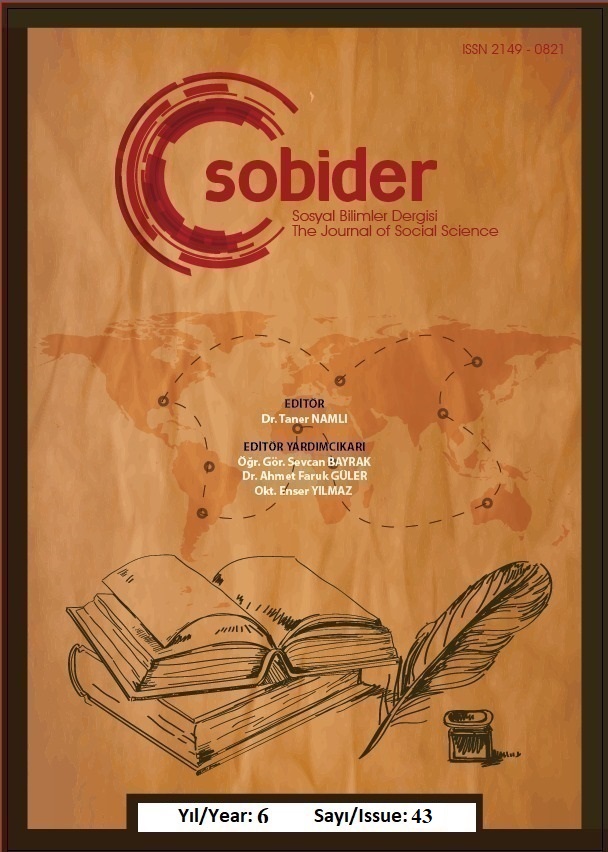Author :
Abstract
Her alanda olduğu gibi yabancı dil eğitimi alanında da teknolojik gelişmelerin önemli bir katkı oluşturduğunu söyleyebiliriz. Teknolojinin dil eğitimi alanına sunduğu katkı özellikle öğrenen özerkliği bağlamında değerlendirilebilir. Gelişen bilgisayar, telefon ve yazılım teknolojilerinin dil öğrenen bireylerin okul ve ders dışındaki zaman diliminde kendi dil öğrenme süreçlerini sürdürebilmelerine olanak sağlaması sürecin devamlılığı açısından çok büyük önem arz etmektedir. Bu çerçevede Teknoloji Destekli Yabancı Dil Eğitimi önemli bir eğilim haline gelmiştir. Bu bağlamda salt bu konu üzerine yazılmış pek çok akademik çalışma önemli uluslararası dergilerde yayınlamıştır ve hatta bazı önemli dergiler kapsam olarak sadece Teknoloji Destekli Yabancı Dil Eğitimi üzerine kuruludur. Aynı şekilde, çok sayıda yüksek lisans ve doktora tezi de bu konu üzerine odaklanmıştır. Konu teknoloji olduğu için teknolojinin dil eğitimi bağlamında kullanılması ile ilgili kavramlar çoğunlukla İngilizce kökenli olup bu kavramların Türkçe karşılıkları tam olarak yerleşmemiştir. Bu çalışma kapsamında teknolojinin dil eğitimi çerçevesinde kullanımı bağlamında farklı boyutlarda ortaya çıkan terimlerin Türkçe karşılıkları ortaya konmuş ve yaklaşık 300 terimden oluşan bir sözlükçe çalışması sunulmuştur. Oluşturulan sözlükçede yer verilen terimler genel teknoloji terimleri (bandwidth, augmented reality vb.), teknoloji kullanımına ilişkin etik terimler (cybercrime, copyright vb.) genel donanımsal ve yazılımsal terimler (keyboard, hardware vb.), teknoloji destekli dil öğrenimine yönelik özel terimler (virtual learning, flipped learning vb.) ve birleşik (portmanteau) terimler (webinar, malware vb.) olmak üzere beş ana kategoriden seçilmiştir.
Keywords
Abstract
As in every field, we can say that technological developments have an important contribution in the field of foreign language education. The contribution of technology to language education can be evaluated in the context of learner autonomy. It is of great importance that the developing computer, phone and software technologies enable language learners to maintain their own language learning processes outside the school and class. Within this framework, Technology-Enhanced Language Learning has become an important trend. In this context, many academic studies on this subject have been published in important international journals, and even some important journals are based solely on Technology-Enhanced Language Learning. Likewise, a large number of master’s and doctoral theses have focused on this aspect. As the subject is technology, the terms related to the use of technology in the context of language education are mostly of English origin and their Turkish equivalents are not fully established. In the context of this study, the Turkish equivalents of the terms that emerged in different dimensions in the context of the use of technology within the framework of language education have been presented and a glossary consisting of about 300 terms is presented. The terms covered in the glossary are selected from five main categories: general terms of technology (bandwidth, augmented reality, etc.), ethical terms about the use of technology (cybercrime, copyright, etc.), general hardware and software terms (keyboard, hardware, etc.), specific terms for technology-enhanced language learning (virtual learning, flipped learning, etc.) and portmanteau terms (webinar, malware, etc.).
Keywords
- Akalın, Ş. H., Cebeci, Z., Bada, E., Mıtış, B., Acar, L., & Tan, A. (2008). Bilgisayar terimleri karşılıklar kılavuzu. Ankara: Türk Dil Kurumu Yayınları.
- Altan, N. (2003). Bilgisayar terimleri ansiklopedik sözlüğü (3. bs.). Ankara: Sistem Yayıncılık.
- Boğaç, E., ve Songür, M. (Ed.) (1999). Açıklamalı bilgisayar ve internet terimleri sözlüğü. Ankara: Hacettepe-Taş Yayınları.
- Boztaş, İ. (2003). Çeviri Sözlüğü. Ankara: Hacettepe-Taş Yayınları.
- Chinnery, G. M. (2006). Emerging technologies: Going to the MALL: Mobile assisted language learning. Language Learning & Technology, 10(1): 9-16.
- Dhaif, H. A. (1989). Can computers teach languages? English Teaching Forum, 27(3), 17-19.
- Hockly, N. (2012). Mobile learning, ELT Journal. 67(1), 80-84.
- İmer, K., Kocaman, A., & Özsoy, A. S. (2011). Dilbilim sözlüğü. İstanbul: Boğaziçi Üniversitesi Yayınevi.
- Karaağaç, G. (2013). Dil bilimi terimleri sözlüğü. Ankara: TDK Yayınları.
- Karasar, N. (2005). Bilimsel araştırma ve yöntemi (15. Baskı). Ankara: Nobel Yayın Dağıtım.
- Kocaman, A. & Osam, N. (2000). Uygulamalı dilbilim-yabancı dil öğretimi terimleri sözlüğü. Ankara: Hitit Yayınları.
- Kukulska-Hulme, A. (2009). Will mobile learning change language learning? ReCALL, 21(2):157-165.
- Oxford, R. L. (2016). Teaching and researching language learning strategies: Self-regulation in context. Routledge.
- Redhouse (2010). Eğitim Terimleri Sözlüğü. İstanbul: Sev Yayıncılık.
- Thornton, P. & Houser, C. (2005). Using mobile phones in English education in Japan. Journal of Computer Assisted Learning, 21(3):217-228.
- Toyoda, E. (2001). Exercise of learner autonomy in project-oriented CALL. CALL-EJ Online, 2(2), 1-14.
- Vardar, B. (Ed.). (1980). Dilbilim ve dil bilgisi terimleri sözlüğü. Ankara: TDK Yayınları.
- Vardar, B. (Ed.). (2002). Açıklamalı dilbilim terimleri sözlüğü. İstanbul: Multilingual Yayınları.
- Warschauer, M., & Healey, D. (1998). Computers and language learning: An overview. Language Teaching, 31, 57-71.
- Yaman, İ. (2016). Akademik Terimler ve İfadeler Sözlüğü. İstanbul: Yalın Yayıncılık.
- Yaman, İ. ve Ekmekçi, E. (2018). İngiliz dili eğitimi alanında yaygın bir şekilde kullanılan bazı terimlerin Türkçeye aktarımı sorunu. Diyalektolog, 18, 143-167.
- White, J., & Mills, D. J. (2014). Examining attitudes towards and usage of smartphone technology among Japanese university students studying EFL. CALL-EJ, 15(2), 1-15.
- Yıldırım, A. ve Şimşek, H. (2013). Sosyal bilimlerde nitel araştırma yöntemleri (9. Baskı). Ankara: Seçkin Yayıncılık.
- Zülfikar, H. (1991). Terim sorunları ve terim yapma yolları. Ankara: Türk Dil Kurumu Yayınları.
- http://fatihprojesi.meb.gov.tr (Ziyaret Tarihi: 21.10.2018)
- http://www.tdk.gov.tr (Ziyaret Tarihi: 21.10.2018)
- http://tureng.com/tr/turkce-ingilizce (Ziyaret Tarihi: 21.10.2018)
- https://www.ebsco.com/products/research-databases/academic-search (Ziyaret Tarihi: 02.11.2018)





